ABU DHABI, (Pakistan Point News - 26th Jul, 2021) Summer vacation is a "strong opportunity" for parents to break the habit of children spending excessive time on electronic devices, which takes a heavy toll on their mental and physical health, a senior doctor told Emirates news Agency (WAM).
As children have been spending a big amount of time on online classes, parents could encourage them to completely avoid or at least minimise the use of gadgets during the vacation and help build a healthy lifestyle, said Dr. Asma Al Marzouqi, Division Chief, Paediatrics, Sheikh Khalifa Medical City (SKMC), which is under Abu Dhabi Health Services Company (SEHA).
Why to minimise screen time during vacation?
"Distance learning means that children log up to 35-40 hours of screen time a week, only for school. Also, children spend on technology devices after school – on social media, on chatting apps, and playing video games. This means a significant portion of the day is spent staring at a screen," she pointed out.
"Challenges pertaining to eye strain, weight and obesity, and mental health have accelerated amongst children over the past year, with spikes in depression because of less social interaction," Dr. Al Marzouqi added.
As children’s brain is still developing, excessive screen time makes a child more vulnerable to resultant mental and physical problems, she warned.
Therefore, using the summer vacation as an opportunity, parents should try to minimise children’s gadget use and encourage them to do physical activities or practise a hobby like swimming, reading, drawing, painting, art and craft, indoor games, etc., the doctor explained.
Parents could also arrange a daily timeslot of 30-45 minutes for sunlight exposure and practise an outdoor activity like walking, swimming, cycling, running etc. with all family members, she suggested.
"In the case of summer courses or homework, we recommend these to be limited to two hours a day, as per the guidelines set by the American academy of Paediatrics."
As some children may develop improper food habits due to the overuse of gadgets, parents should instil a strict eating schedule encompassing healthy meals and encourage good hydration, the senior paediatrician advised.
Patiently handling children’s resistance
At the same time, the doctor advised that parents must be patient with children while trying to restrict the screen time.
"What is also important in such situations is communication – children are more likely to react negatively if they don’t understand why such actions are being taken. By communicating openly and clearly with your children and explaining why you are setting rules on the use of digital devices, it will help them understand that you are doing this for their own health and well-being, making them less inclined to resist."
Even when the online classes restart after the vacation, the restrictions must be reasonable, Dr. Al Marzouqi advised.
"At this stage, with the switch to online schooling an integral initiative to protect the community from contracting the virus, it is difficult to set a hard rule of screen hours for children."
Although it is ideal for children to completely stop using digital devices after online schooling, and instead spend their time in other activities without using gadgets, the doctor advices a flexible regimen.
"Find a balance – with online schooling taking up most of the screen time, children may feel it unfair that they don’t get the opportunity to spend leisure time on their phones, laptops, etc. and doing the things they enjoy.
"Instead of completely banning screen time after school, allow children a strictly limited time for it. For example, only one hour where they can respond to their friends, watch their favourite shows, etc. Once the hour is complete, encourage them to engage in a hobby they enjoy."
Identifying health conditions and gadget addiction
The doctor advised parents to watch out for potential physical and mental health consequences of extended screen time.
"Keep an eye out for signs of eye pain or strain [if children feel like they can’t see from a certain distance or their eyesight becomes blurry etc.], headaches, sleep disturbances, sudden weight gain, feelings of sadness, quick responses of anger, etc.
Internet Addiction Disorder (IAD) can present itself in the form of both emotional and physical signs and symptoms, the doctor said.
Emotional symptoms include depression, anxiety, isolation, a lack of sense of time, defensiveness, agitation, mood swings, loneliness, boredom with routine tasks etc.
Physical symptoms include backache, headaches, carpal tunnel syndrome (pain, numbness and tingling in the hand and arm), insomnia, neck pain, poor nutrition, weight gain or loss etc.
"If the mentioned symptoms are evident in your children and become more common, make sure to book an appointment with a paediatrician or child psychologist that are available at several facilities throughout the SEHA network."
Distance learning and work from home are also a good opportunity to create time for family bonding, the doctor pointed out.
"The pandemic has been difficult for us, but especially more for children. We need to take time to have more open and honest conversations; hear, understand, and acknowledge their feelings; and reassure them they aren’t alone. This will help significantly in terms of mental health."
Parents also must lead by example, Dr. Al Marzouqi suggested.
"Children like to imitate the adults around them, and as we spend more time indoors, we as adults also tend to turn to our phones and TVs. Let’s put down our technological devices and spend more time with one another, coming up with new and creative ways to replace the activities we used to practise before the pandemic."




